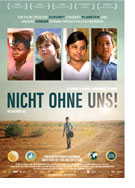

Opening 19 Jan 2017
Directed by:
Sigrid Klausmann
Writing credits:
Sigrid Klausmann, Walter Sittler
Director Sigrid Klausmann, with the help of assistant directors Lina Luzyte, Ali Kareem, Ariane Kessissoglou and Insa Onken and 13 camera teams, set out to interview 15 children around the world. They are: Alphosine, Anish, Ekhlas, Enjo, Finya, Jaffer, Luniko, Perla, Rebekka, Sai, Sanjana, To, Valeria, Vincent, and Yamabuki from the Ivory Coast, Nepal, Jordan, Switzerland (2x), Germany, Iraq, South Africa, Iceland, the USA, India, Laos, Peru, Austria, and Japan. The children are about 11 to 12 years old, evenly divided among girls and boys. The camera goes from one child to the next for parallel activities during a day, such as getting out of bed in the morning, saying good-bye to the family, going to school, sitting in class, etc. In this way we have direct comparisons between the various cultures.
However, the children are not always typical representatives of their age group in their country. For example Rebekka is blind; Lunko is HIV positive; Sai represents the U.S. in a fancy school in New York City, but is actually an immigrant from India; To must ride two hours on a boat to get to school. No adults comment, only the children, which makes it doubly interesting considering that they are the future of this planet. They speak about the environment, wartimes, poverty and their hopes for the future.
This is the result of a long-term project called 199 kleine Helden (199 Small Heroes), which started in 2011 with the goal to present 199 similar children around the world; on this website you can read about some of the children in this film. The children are equally interesting and will affect the viewer in different ways. I was especially dedicated to Alphosine from the Ivory Coast. She is an orphan with no schooling and works for her adoptive family. She takes food into the jungle where children, even younger than she is, are harvesting beans from cacao trees to make chocolate. Alphosine says, “I know that chocolate is sweet, but I’ve never eaten any.” I hear this, after listening to a lecture on human trafficking and fair trade chocolate.
Nicht ohne uns! played at the 2016 Michel Kinder und Jugend Filmfest (children’s film festival) in Hamburg. It’s definitely worth your time, whether you are an independent viewer or associated with a school and wish to take your class to the cinema for a discussion afterwards. (Becky Tan)